Festival Zurich meets Seoul
-
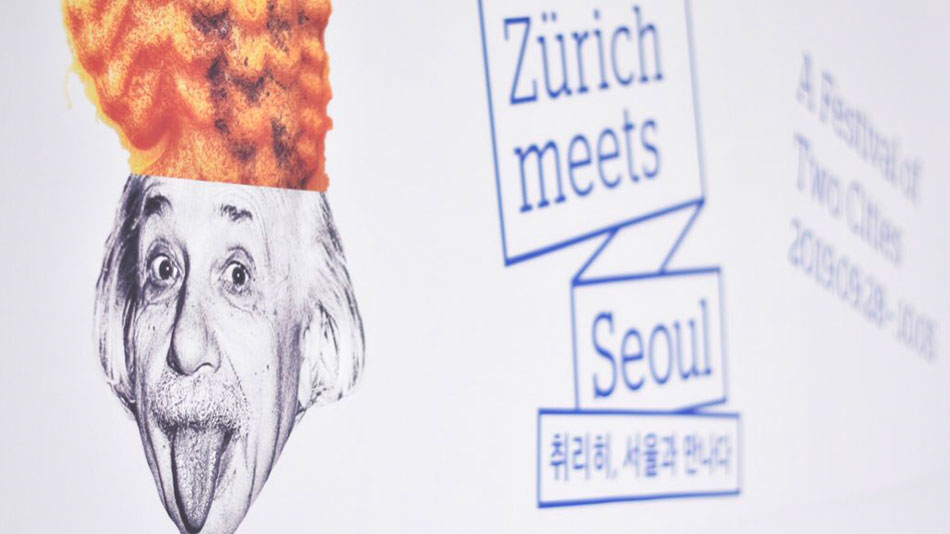 “Zürich meets Seoul – A Festival of Two Cities”, organized by the Canton and City of Zurich, Zurich Tourism, and the Zurich universities, clearly positions Zurich as a lively center for science, innovation and culture. (Picture: Priska Feichter)
“Zürich meets Seoul – A Festival of Two Cities”, organized by the Canton and City of Zurich, Zurich Tourism, and the Zurich universities, clearly positions Zurich as a lively center for science, innovation and culture. (Picture: Priska Feichter) -
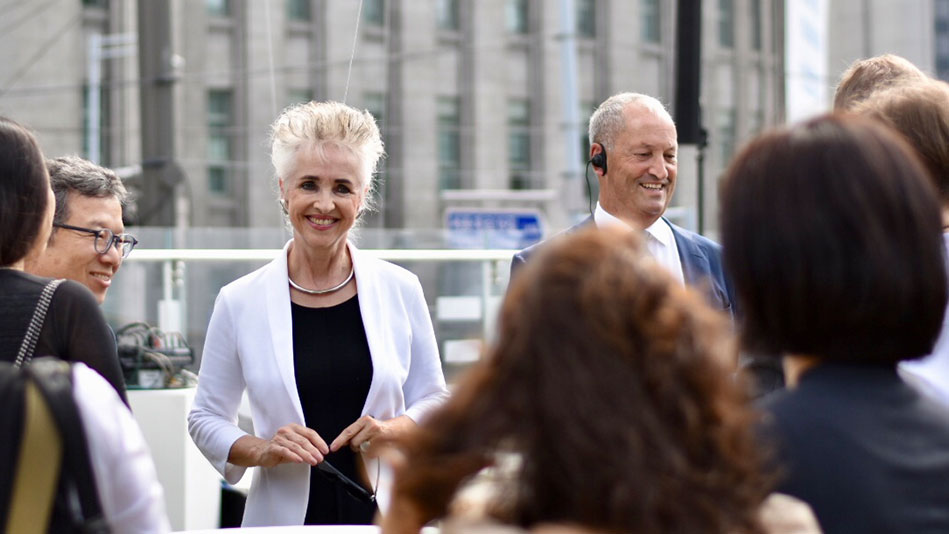 In previous years the “Zurich meets...” festival has taken place in New York (2014), London (2016), Hong Kong (2017) and San Francisco (2018). Zurich government councilor Carmen Walker Späh and Brentel Guilielmo, President of Zurich Tourism, at the opening. (Picture: Priska Feichter)
In previous years the “Zurich meets...” festival has taken place in New York (2014), London (2016), Hong Kong (2017) and San Francisco (2018). Zurich government councilor Carmen Walker Späh and Brentel Guilielmo, President of Zurich Tourism, at the opening. (Picture: Priska Feichter) -
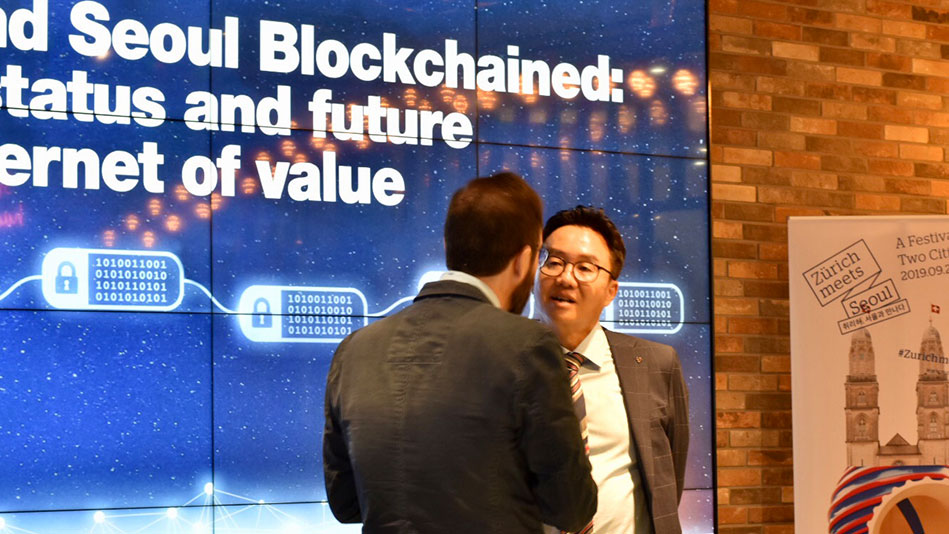 A core topic that links both cities is the development of blockchain technologies. Seoul, like Zurich, is one of the biggest international blockchain hubs. Claudio Tessone, Director of the UZH Blockchain Center in conversation with Professor Sooyong Park of Sogang University. (Picture: Priska Feichter)
A core topic that links both cities is the development of blockchain technologies. Seoul, like Zurich, is one of the biggest international blockchain hubs. Claudio Tessone, Director of the UZH Blockchain Center in conversation with Professor Sooyong Park of Sogang University. (Picture: Priska Feichter) -
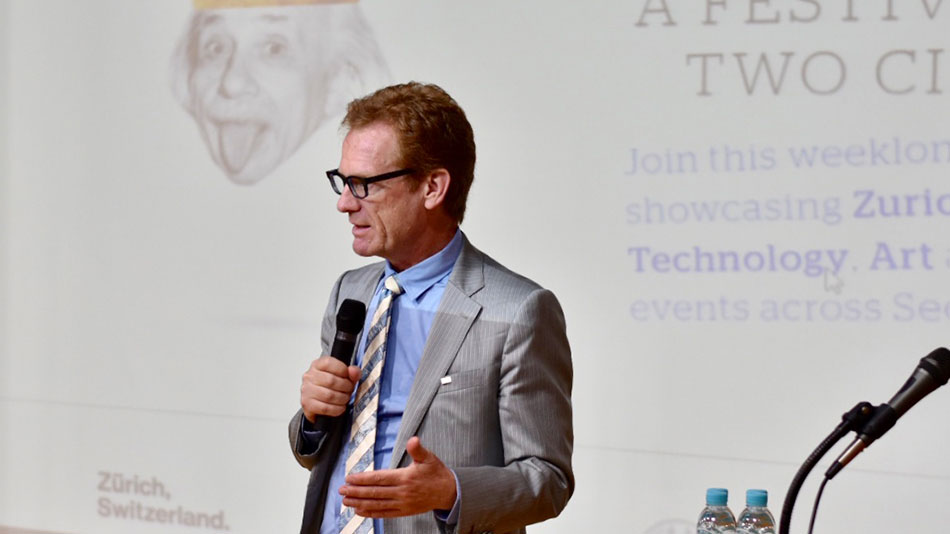 Blockchains can serve not only as the basis for cryptocurrencies, but also, for example, to control supply chains, said Vice President Christian Schwarzenegger. (Picture: Priska Feichter)
Blockchains can serve not only as the basis for cryptocurrencies, but also, for example, to control supply chains, said Vice President Christian Schwarzenegger. (Picture: Priska Feichter) -
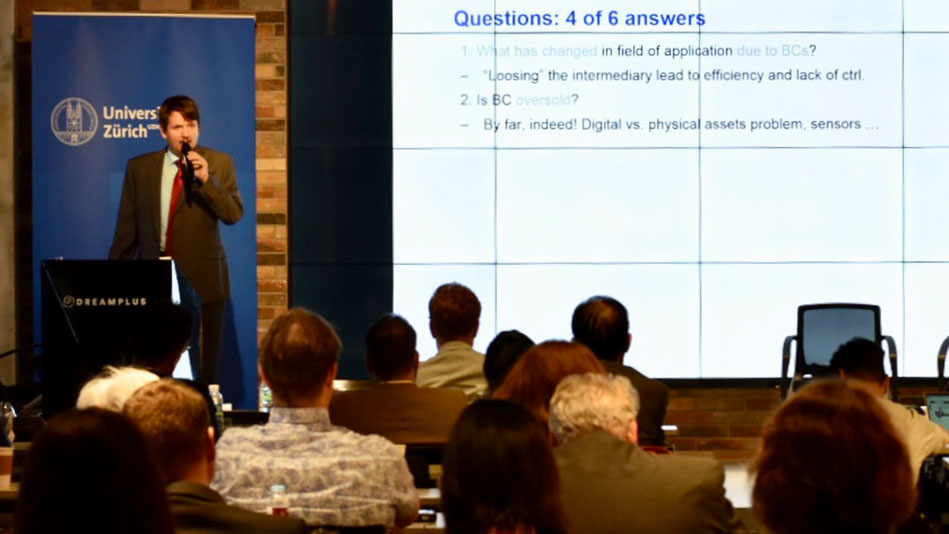 Blockchain has potential applications in a wide variety of sectors. One of its central features is that the data are distributed decentrally on many different computers, where they are stored, timestamped and can no longer be changed. Pictured: Professor of informatics Burkhard Stiller. (Picture: Priska Feichter)
Blockchain has potential applications in a wide variety of sectors. One of its central features is that the data are distributed decentrally on many different computers, where they are stored, timestamped and can no longer be changed. Pictured: Professor of informatics Burkhard Stiller. (Picture: Priska Feichter) -
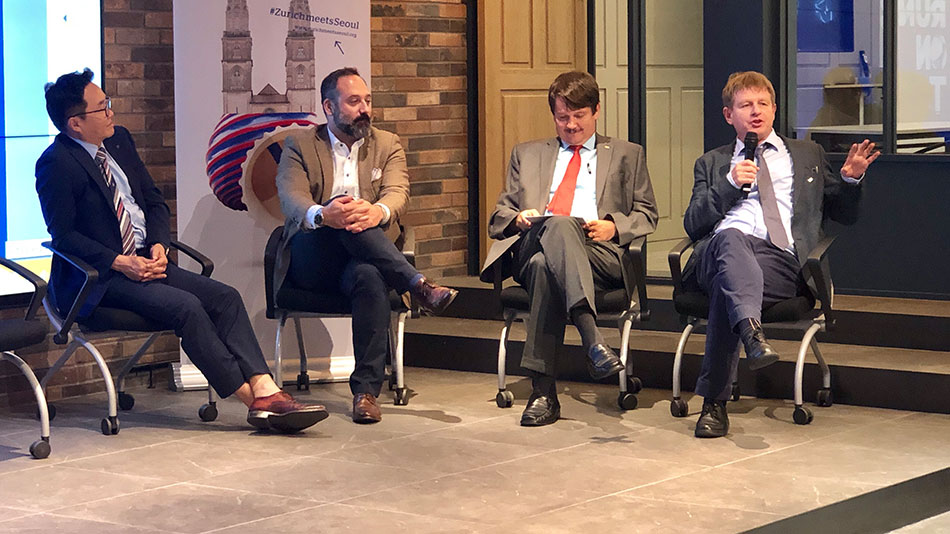 A current UZH research project uses blockchain to store all data about a car, from the date of its production until it is recycled, thus eliminating the usual asymmetry of information between seller and buyer when trading a used car. Professor of informatics Gerhard Schwabe (right) presents the Car Dossier project. (Picture: Priska Feichter)
A current UZH research project uses blockchain to store all data about a car, from the date of its production until it is recycled, thus eliminating the usual asymmetry of information between seller and buyer when trading a used car. Professor of informatics Gerhard Schwabe (right) presents the Car Dossier project. (Picture: Priska Feichter) -
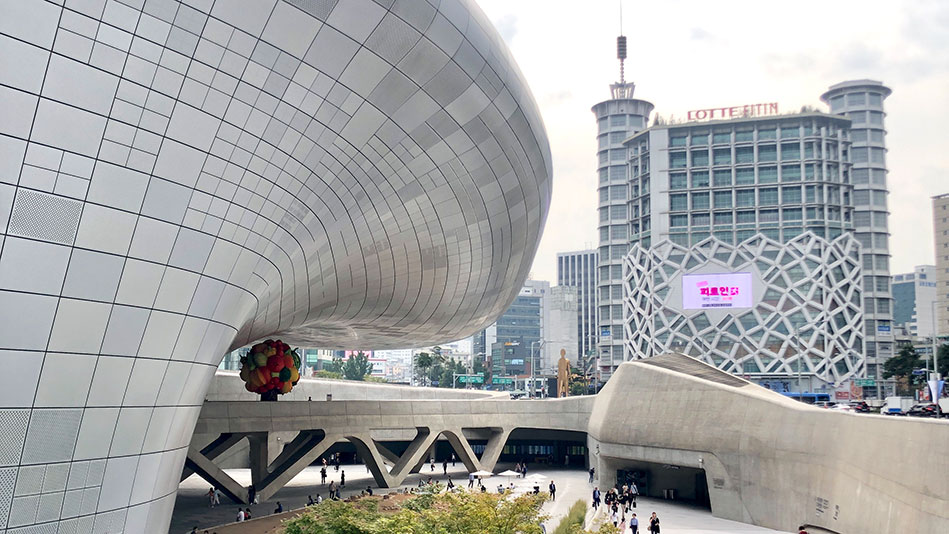 Another hot topic was “Smart Cities”, which was on the agenda as part of the Seoul Smart City Summit 2019. The summit took place at the Dongdaemun Design Plaza (in the foreground) which was designed by star architect Zaha Hadid. (Picture: Priska Feichter)
Another hot topic was “Smart Cities”, which was on the agenda as part of the Seoul Smart City Summit 2019. The summit took place at the Dongdaemun Design Plaza (in the foreground) which was designed by star architect Zaha Hadid. (Picture: Priska Feichter) -
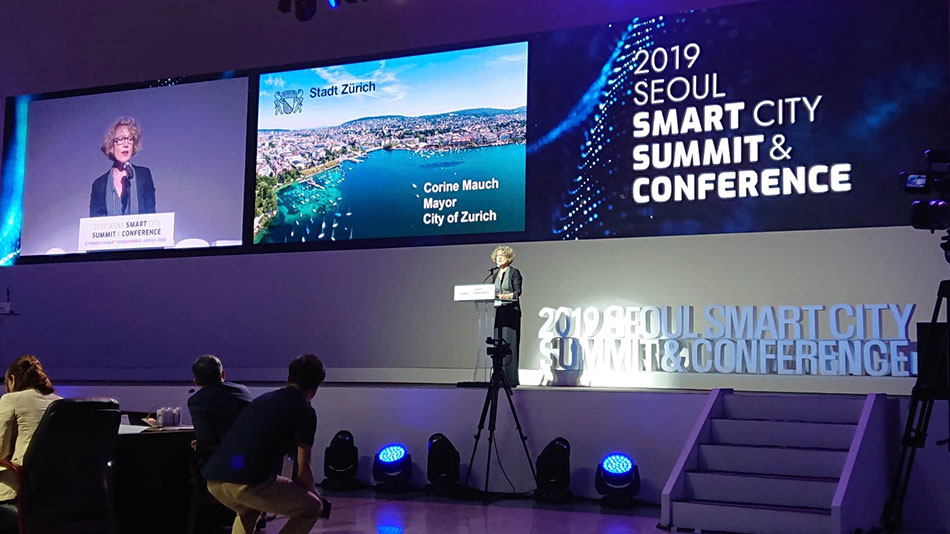 With the construction of a national 5G network, Korea is one of the first countries worldwide to lay the foundations for the Internet of Things, a concept that comprises self-driving vehicles, intelligent houses and cities, digital identities, and payment systems. Photo: City President Corine Mauch at the opening of the Seoul Smart City Summit. (Picture: Priska Feichter)
With the construction of a national 5G network, Korea is one of the first countries worldwide to lay the foundations for the Internet of Things, a concept that comprises self-driving vehicles, intelligent houses and cities, digital identities, and payment systems. Photo: City President Corine Mauch at the opening of the Seoul Smart City Summit. (Picture: Priska Feichter) -
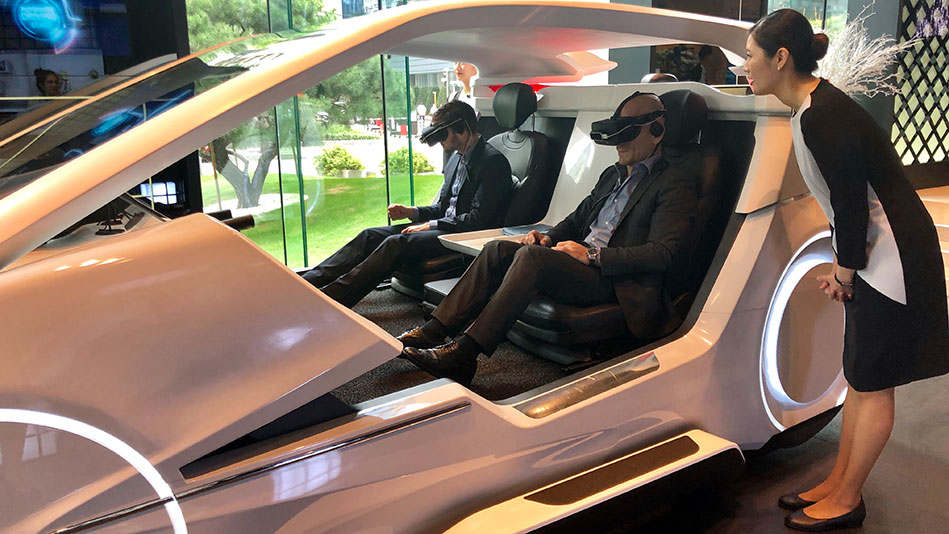 The business delegation of Zurich meets Seoul, in which the UZH Faculty of Business, Economics and Informatics took part, visited various technology companies who presented their solutions and visions, including SK Telecom and the Samsung Medical Center. Pictured: Self-driving car. (Picture: Priska Feichter)
The business delegation of Zurich meets Seoul, in which the UZH Faculty of Business, Economics and Informatics took part, visited various technology companies who presented their solutions and visions, including SK Telecom and the Samsung Medical Center. Pictured: Self-driving car. (Picture: Priska Feichter) -
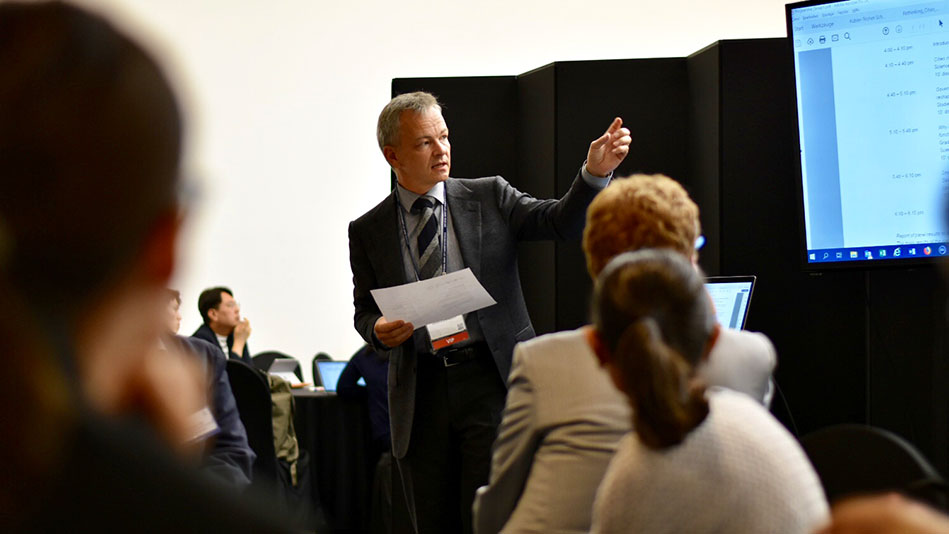 The process of implementing digital technologies into “Smart Cities” has neglected to address societal and political aspects, claims UZH political scientist Daniel Kübler. He led a workshop highlighting the democratic and regulatory challenges. (Picture: Priska Feichter)
The process of implementing digital technologies into “Smart Cities” has neglected to address societal and political aspects, claims UZH political scientist Daniel Kübler. He led a workshop highlighting the democratic and regulatory challenges. (Picture: Priska Feichter) -
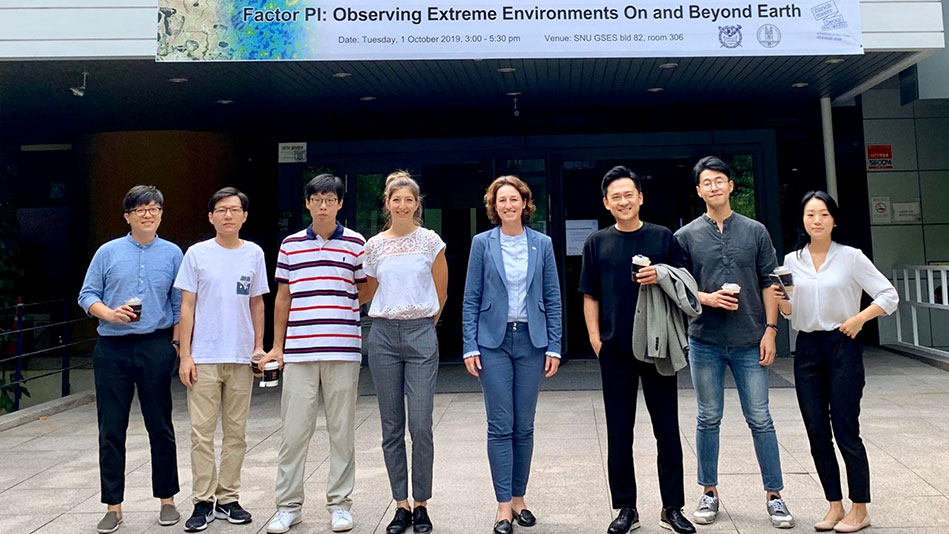 At the third academic event of Zurich meets Seoul, led by environmental scientist Gabriela Schaepman-Strub (fourth from right) and astrophysicist Jaiyul Yoo, it quickly became clear that there were many potential areas in which the two cities could collaborate on research in the natural sciences. (Picture: Priska Feichter)
At the third academic event of Zurich meets Seoul, led by environmental scientist Gabriela Schaepman-Strub (fourth from right) and astrophysicist Jaiyul Yoo, it quickly became clear that there were many potential areas in which the two cities could collaborate on research in the natural sciences. (Picture: Priska Feichter) -
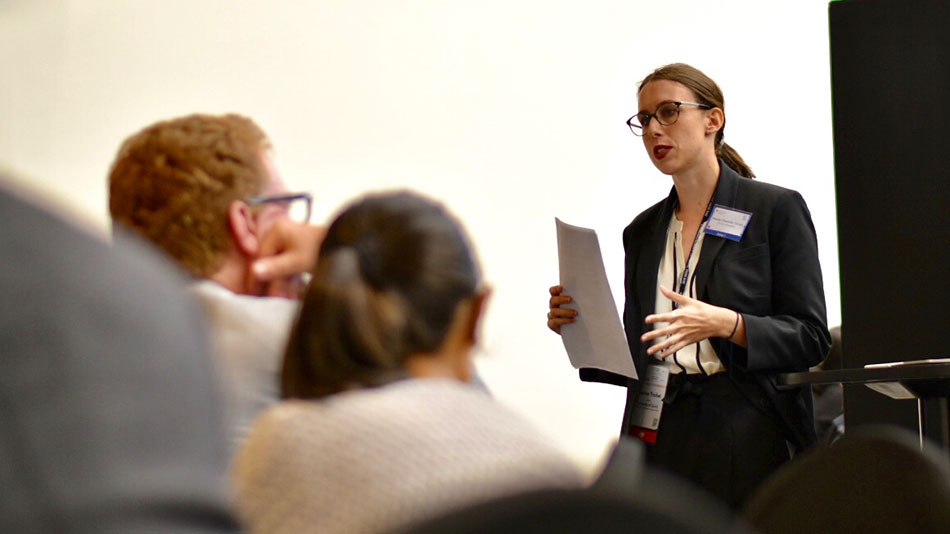 At the same time, the example of Uber shows that consumers do benefit considerably from new business models, for example in the form of lower prices and better service also from traditional taxi companies. Over-regulation would therefore be counterproductive. Pictured: Doctoral candidate in politics Marine Trichet. (Picture: Priska Feichter)
At the same time, the example of Uber shows that consumers do benefit considerably from new business models, for example in the form of lower prices and better service also from traditional taxi companies. Over-regulation would therefore be counterproductive. Pictured: Doctoral candidate in politics Marine Trichet. (Picture: Priska Feichter) -
 Thank you Seoul, for the great hospitality! (Picture: Priska Feichter)
Thank you Seoul, for the great hospitality! (Picture: Priska Feichter)